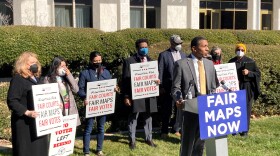-
The justices on Tuesday rejected the broadest view of a legal theory that could have transformed elections for Congress and president by leaving state legislatures virtually unchecked by their state courts when dealing with federal elections.
-
Gov. Roy Cooper picked the five members from nominees provided by the state Democratic and Republican parties. The panel is tasked with helping implement a photo voter ID law and administering 2024 elections for president, governor and a host of other positions.
-
On Friday, the North Carolina Supreme Court issued three rulings — spanning voter ID, redistricting, and voting access for people with felony convictions — that will have a deep impact on how the state conducts elections.
-
Friday's opinions come less than four months since a new Republican majority on the court took their seats. The court swept away decisions made in December when the Democrats held a 4-3 seat advantage.
-
Republicans got rehearings in two election-related cases they lost last year at the then-Democrat-majority high court.
-
The court had affirmed Republican legislators can’t draw electoral districts that are excessively partisan in an otherwise closely divided state. What’s changed since December? Republicans now hold a majority on the court.
-
The North Carolina Supreme Court is revisiting this week whether a previous combination of justices got it wrong three months ago when declaring that the legislature produced illegal district lines tainted by excess partisanship and a photo voter identification law infected with racial bias.
-
The North Carolina Supreme Court granted a petition filed by GOP legislators to rehear voter ID and redistricting cases that went against them last year when Democrats held a majority on the court
-
The Supreme Court on Wednesday seemed skeptical of making a broad ruling that would leave state legislatures virtually unchecked in making rules for congressional and presidential elections.
-
¼ª²ÊÍøÍøÕ¾'s Will Michaels and Jeff Tiberii break down how Moore v. Harper may have sweeping effects on the fundamental American democratic system of checks and balances.
Play Live Radio
Next Up:
0:00
0:00
Available On Air Stations










